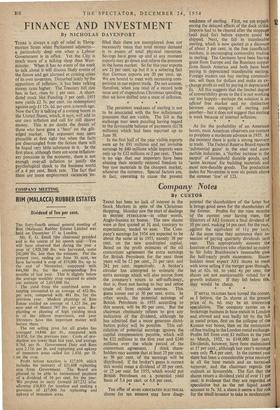FINANCE AND INVESTMENT
' By NICHOLAS DAVENPORT THERE is always a sigh of relief in Throg- Morton Street when Parliament adjourns— a particularly deep one when a Labour Government is in office. Yet the City is much more of a talking shop than West- minster. When it has no event of the week to talk about it will discuss likely events of the future and get alarmed at coming crises of its own invention. Disturbed lately by the apparition of inflation, it has been talking money rates higher. The Treasury bill rate has, in fact, risen by 1 per cent. A short- dated stock like Funding 3 per cent. 1955 now yields £2 7s. per cent. (to redemption) against only £1 12s. 6d. per cent. a month ago. Now the City is talking of a coming boom in the United States, which, it says, will add to our own inflation and call for still dearer money. This is no doubt the dream of those who have gone a `bear' on the gilt- edged market. The argument may seem plausible at first sight but when the facts are disentangled from the fiction there will be found very little substance in it. In the first place, although there are some inflation- ary pressures in the economy, there is not enough over-all inflation to justify the psychological shock to the business world of a 4 per cent. Bank rate. The fact that there are- more employment vacancies tut- filled than there are unemployed does not necessarily mean that total money demand is in excess of total physical resources. Savings have gone up and at any moment exports may go down and relieve the pressure in the home market. So far this year exports are 2} per cent. up but it is a sobering fact that German exports, are 20 per cent. up. We are bound to meet with increasing com- petition in our export trade. Do not assume, therefore, when you read of a record note issue and of stupendous Christmas spending, that we have drifted into a state of inflation.
•
The persistent weakness of sterling is not to be associated with the few inflationary pressures that are visible. The fall in the exchange may seem puzzling having regard to the favourable balance of payments (£178 millions) which had been reported up to June 30.
In the first half of the year visible exports were up by £91 millions and net invisible earnings by £40 millions while imports were only up by £32 millions or 2 per cent. There is no sign that our importers have been abusing their recently restored freedom to buy raw materials in the 'cheapest market, whatever the currency. Special factors are, in fact, operating to cause the present weakness of sterling. First, we are expert. encing the delayed effects of the dock strike. Imports had to be cleared after the stoppage (and paid for) before exports could be shipped. Next, the fall in transferable sterling, which is now quoted at a discount of about 3 per cent. in the free (unofficial) markets, is encouraging commodity trading in sterling. The Germans have been buying grain from Europe and the Russians copper from South America and both have been paying in depreciated transferable sterling. Foreign traders can buy sterling commodi- ties, sell them for dollars and make an ex- change profit as well by paying in depreciated £s. All this suggests that the limited degree of convertibility given to the £ is not working out too happily—perhaps the solution is an official free market and no distinction between one category of sterling and another—but it does not suggest that sterling is weak because of internal inflation.
As for the probability of an American boom, most American observers are content to prophesy a moderate advance in 1955. At the moment there is quite a strong recovery in trade. The Federal Reserve Board reports 'substantial gains' in the steel and auto- mobile industries, a 'further increase in the 'output' of household durable goods, and 'some increase' for building materials and most non-durable goods. The production index for November is now six points above the summer `low' of 123.


























 Previous page
Previous page